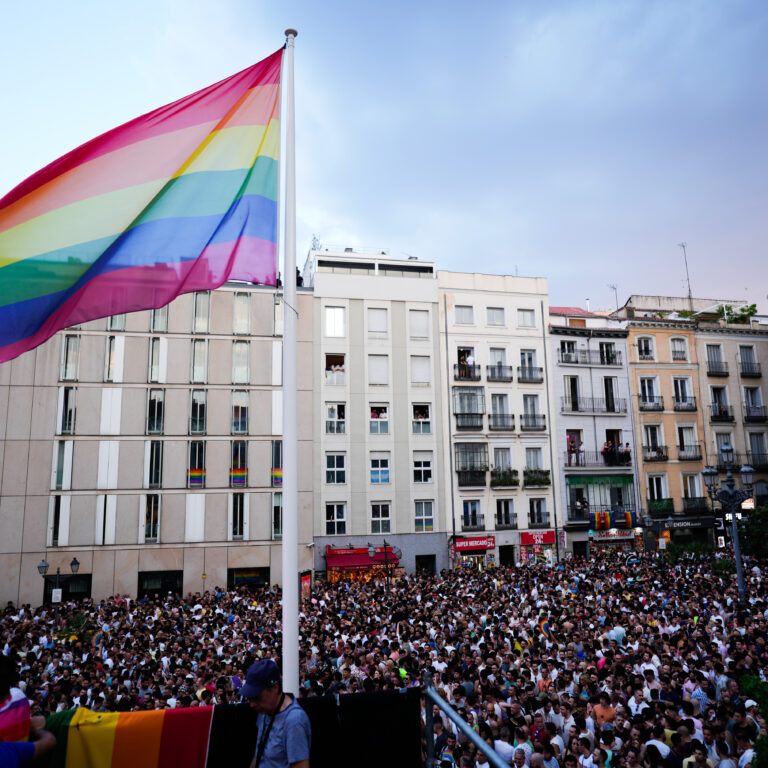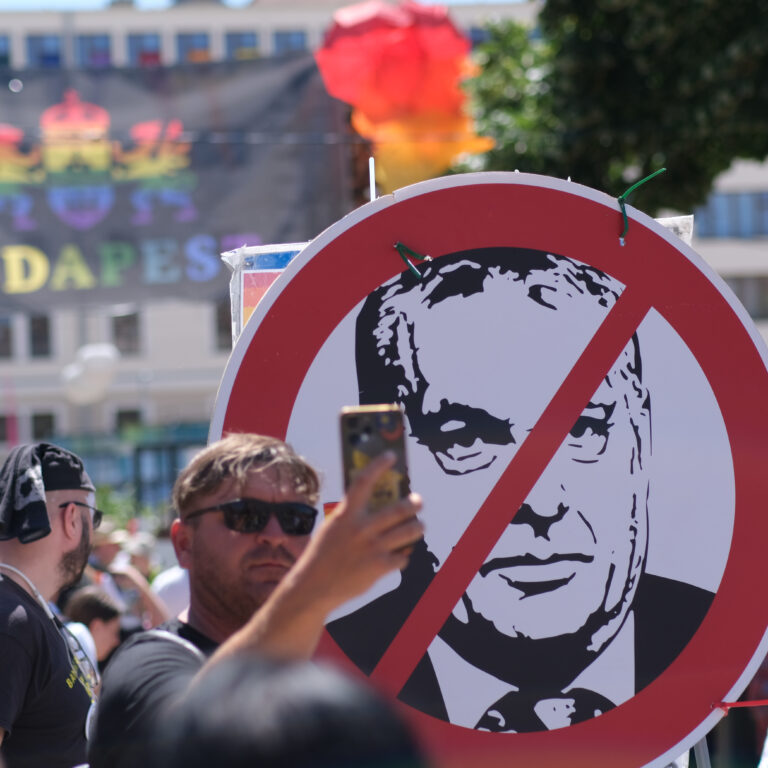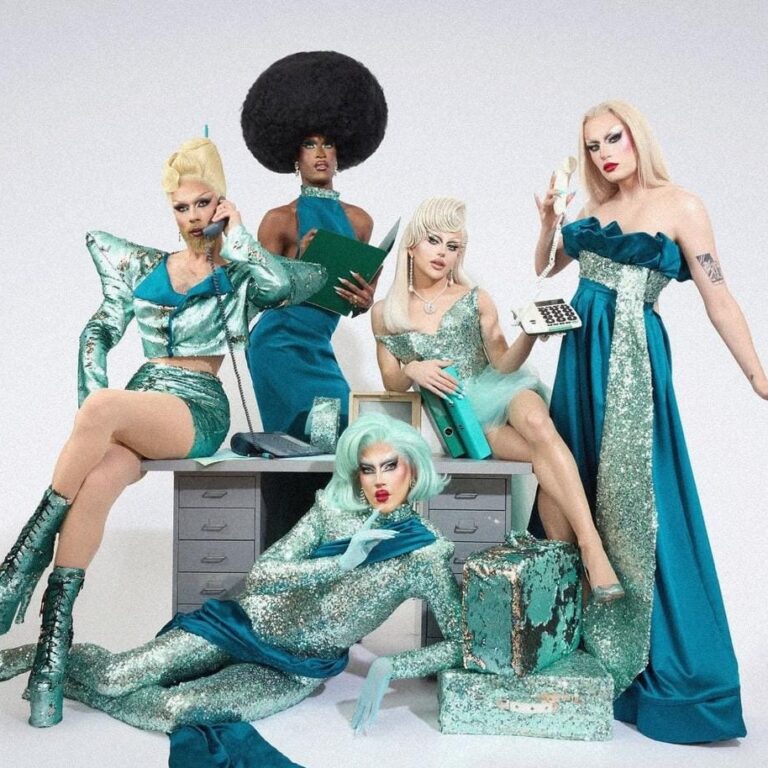In Nicaragua, the struggles of the LGBTIQ+ community have been going on for decades with some slow progress but with major setbacks. The socio-political crisis in 2018 deepened gender inequalities; that today pose new challenges for LGBTIQ+ people.
By: Intertextual Editorial/contacto@intertextualcr.comnThis is a work by: Intertextual in collaboration with República 18 and Primer Orden Nicaragua
The struggle of the LGBTIQ+ community is advancing slowly in Nicaragua, say different people consulted by Intertextual for this report, although they agree that during the year 2018, when the massive demonstrations against Daniel Ortega’s regime arose, there was a stagnation in the demands of this sector.nnActivists claim that, although the current regime of Daniel Ortega is defined as a left-wing government, it maintains positions similar to those of the dictator Anastasio Somoza, the leader deposed during the Sandinista revolution of 1979.nnAfter Daniel Ortega came to power in 2007, the Nicaraguan president repealed article 204 of the Criminal Procedure Code a year later. This article penalized relationships between people of the same sex with up to three years in prison and was created in 1992 by the Government of Violeta Barrios de Chamorro.

You may be interested in reading: What does “I” mean within the LGBTIQ+ community?
The reform took place in 2008 and came into force in 2009. However, Daniel Ortega had something on his hands since at the same time that they repealed article 204, they criminalized abortion in all its forms, which was more than 150 years old. to be valid in Nicaragua.
Experts assure that at that time there was a cycle of greater flexibility for the LBGTIQ+ community. “There were even bars in a more open way, when previously you could not socialize without fear, even going to a bar was done clandestinely,” says Adriano, an LGBTIQ+ activist who prefers to be cited in that way for fear of reprisals.
María Teresa Blandón, Nicaraguan feminist, sociologist and director of the Central American NGO “La Corriente”, highlights that, although there was a formal decriminalization of “sodomy”, as had been stipulated for relationships between two people of the same sex, it was not They established regulations on how to address sexual and gender dissidence.
“The law is not automatic as happened in Nicaragua, that it was removed from the Penal Code as a crime and that it is implicitly recognized that it is a right and another thing is, if dissidents are really recognized by the laws, by public policies; and if they are treated as citizens, by society.”
Fernando Carcache, general coordinator of the canceled Puntos de Encuentros organization, assures that part of the repeal of article 204 “was due to international conditions in the sense that the government of Daniel Ortega and other governments have international commitments and parts of these commitments are also to broaden their perspectives on human rights.”
Also read: The struggle of the LGTBIQ+ community in Nicaragua is also forced into exile
Carcache, who is also a sociologist, says that, “just as Daniel Ortega’s government uses its power to change laws, it could create laws in favor, specifically of the community, gay marriage, recognition of the union of deeds, incorporation into the labor markets of the LGBTIQ+ community and particularly trans and intersexual, access to credit, access to name changes.”
After the repeal of article 204, the government of Daniel Ortega authorized the creation of the Human Rights Ombudsman’s Office, an office for the Special Prosecutor for Sexual Diversity that later added attention to people with HIV and sex workers.
Indice
ToggleActivists consider that this office has actually been “sterile”, since there have been no results.
Adriano, who for decades has been immersed in the demands of the Nicaraguan gay population, also commented that he has had to live through several stages in Nicaragua, witnessing firsthand the situation of the LGBTIQ population.
He recalled the decade of the 1950s when Anastasio Somoza García governed, little was said about gender, but there was a phenomenon of support among university students for dissident bodies.
“I can mention that many LGBT people or leaders, most of them were in the closet, they did not speak openly. It was in the Student Movement in the 1950s, where lesbians and gays who were student leaders received certain support despite knowing their identity or orientation; little is said about those pages of history,” says Adriano.n
Rigoberto López Pérez: hero of the LGBTIQ+ community, the little-told story
Adriano mentions, for example, Rigoberto López Pérez, who was homosexual and was made invisible for his heroic deed.

In the chronicle blog of David Rocha, who is a professor in the Department of Communications and Culture of the Universidad Centroamericana José Simeón Cañas (UCA, El Salvador), a very relevant event is unraveled, such as the murder of Anastasio Somoza García in 1956 in hands of Rigoberto López Pérez. “Although in the official histography he is not assumed to be homosexual, it is an open secret that the poet Leones had a romantic relationship with Rafael Corrales,” the blog reads.
López Pérez’s identity and his value mark the history of the invisibilized LGBTIQ+ struggle in Nicaragua.
Activists have proposed that as a result of what López did, murdering Somoza García, the Diversity Network of Unión Democrático Renovadora (UNAMOS) or before that the Sandinista Renewal Movement (MRS) have proposed that National Pride Day be celebrated in March to commemorate his historic feat.
The identity of Rigoberto López Pérez according to the writer Eduardo Arellano, was confirmed in an extensive memorandum from the Nicaraguan ambassador, Dr. Leonte Herdocia in El Salvador on October 26, 1956, following the attack on Somoza.
Discrimination and prejudice were excessive at that time, the writer Arellano highlights, but it was not compared to the mortal feat of the brave young man. “Sexual preference did not cancel out the patriotic fiber and reduced his gigantic work at the same time that with his heroic deed he defeated the homophobic machismo of Nicaragua and granted a victory to the gay community that would have a national hero among its peers,” he said in his article. opinion of the Nuevo Diario, on October 12, 2013.
Being from the LGBTIQ+ community was illegal, the first march for rights
Adriano indicates that during the time of the Somoza dictatorship and even after the Sandinista Revolution there was a certain tolerance despite the illegality of being from the LGBTIQ+ community.
What our interviewee said is supported by the “Dissident Memories” Research of the La Corriente Feminist Program where he explains that this illegality was expressed with a “profound rejection” of any gender expression or orientation of desire that deviates from the heterosexual model.
The underground and the revolution. How did the LGBTIQ+ community experience it?
The FSLN has labeled homosexuality and lesbianism as an immoral legacy of North American imperialism, argues Memorias Disidentes, asserting that torture such as: Insults, blackmail, severe punishments, physical attacks and rapes are among the expressions of violence suffered by lesbians, homosexuals and bisexuals. “Silence, fear and shame accompanied dozens of homosexual, lesbian and bisexual FSLN militants who played a prominent role in defending a Nicaraguan revolution.”

In the year 79 after the revolution, taking up arms was an issue that was not considered compatible with people who recognized themselves as part of the LGBTIQ+ community.
It should be noted that despite this difference that was not well seen, many people from the diverse community began to insert themselves in both artistic and military sectors, “some of us were able to insert ourselves in artistic spaces and even went up to the government stage. Many homosexual artists joined the militancy of those years and Commander Dora María Téllez would be the highest lesbian symbol of our revolutionary history. And we also went to military service to defend the interests of the red-and-black homeland,” says Crónicas de la Ciudad, written by David Rocha in “Our memories, our revolutions: Nicaragua another zero hour.”
LGBTIQ+ in Nicaragua: Being lesbian and homosexual was an attack
La Corriente Nicaragua in the radio program “Bodies sinvergüenza” entitled homosexuals and lesbians in the revolution managed to immortalize in an interview the testimony of Magaly Quintana, a historical feminist activist from Nicaragua who died on May 5, 2019.

Magaly recalled that together with other women she organized the first feminist groups in the country and stood out for her tireless fight for women’s rights. Quintana related that he was a member of the revolutionary student government, where he worked for the FSLN for many years in everything related to propaganda.
Being publicly lesbian and homosexual was a reason for “rejection and attacks in the FSLN,” Magaly asserted, and that prior to the revolutionary victory “lesbians and homosexuals were referred to psychiatric hospitals or psychologists to deal with their cases.” In her story, Quintana points out that to begin the supposed psychological treatment, the lesbians were forced to dress in skirts and dresses.
Quintana stated that being a lesbian was more dangerous than being homosexual – “there was greater discrimination against them” to exemplify what was said, she said that she was mobilized to Matagalpa, an area where the war was quite strong. “State security, guided by Lenin Cerna, ordered the destruction of lesbian groups in Matagalpa, for this arbitrary action they sent men, the most handsome, macho, to carry out a process of convention and conversion. The job those men were assigned was to harass,” said the revolutionary activist.
When they tried to group together, the lesbians were again dismantled, some were sent to the Soviet Union supposedly on vacation. But others were sent to the war zone, “the message was clear, they were sent to disappear,” the historic activist recalled.
With the triumph of the Revolution, people from LGBTIQ+ dissident bodies want to be more visible
LGBTIQ+ people who were clandestine began to organize into collectives in 1989, they wanted to come out and make their participation in the revolution visible; There was a public presence of the diverse community in what would symbolically be the first Pride march on the tenth anniversary of the Sandinista revolution, describes the speech published in Crónicas de la Ciudad, highlighting that “50 homosexuals and lesbians marched with black t-shirts and pink triangles.” : It was the zero hour to make ourselves visible and show options apart from the new man.”

These 50 people were part of the FSLN and the army, says LGBTIQA+ activist Adriano, who remembers the violent way in which they were attacked for expressing themselves. “Most of these people were subjected to tremendous persecution; a number of them were in jail naked under interrogation.” According to the activist, they wanted them to confess that they were being financed and that they had links with the opposition at that time because they did not conceive of the need to appear publicly showing their identities.
“Most of the people who dared to participate in that first LGBT community march are now dead and few survivors are in exile. They had to flee because they were persecuted, they were not allowed to study, some lost their jobs because they worked in government institutions, others were fired from the army solely for that reason,” Adriano asserts.
Article 204: memories of criminalization against the LGBTIQ+ community
The Dámazo Vargas, a Nicaraguan trans activist and feminist, entered activism when Article 204 had just been repealed. She makes an interesting statement “the massive campaign by activists, mainly feminist women, cost them dearly, therapeutic abortion, which was the “only way to safeguard women’s lives.”
The trans activist says that before Article 204 was repealed, the LGBTIQ+ population had to work from other perspectives. “They couldn’t talk about human rights as an LGTB person because it was penalized to recognize us as an LGTB person, so everything had to be directed to the health issue, for example, HIV prevention and from there try to organize ourselves as well.”
On February 25, 1990, Daniel Ortega Saavedra, along with other commanders who led the Revolution in Nicaragua, abruptly lost the general elections, with more than 50 percent of the votes against Violeta Barrios de Chamorro, who was the candidate of the political coalition, National Opposition Union (UNO).
While the new president raised her arms to the sky in a sign of victory and peace in Nicaragua, the LGBTIQ+ community was criminalized with article 204 of the criminal procedure code that dictated “anyone who induces, promotes, propagates or practices in a scandalous manner commits the crime of sodomy “concubitus between people of the same sex”.
In the legal framework, being from the LGBTIQ+ community was penalized, and the Barrios government placed emphasis on compliance. “Derived from this penalization of article 204 in the penal code, we see the first discrepancy, where democracy is supposed to have returned to Nicaragua and rights are penalized,” Adriano expands, adding that the persecution against them intensified. It is unknown in how many cases the classification as a crime of “sodomy” served to justify violence and discrimination against LGBTIQ+ people.
During the government of Arnoldo Alemán Lacayo in Nicaragua, by the Constitutional Liberal Party (PLC) in the period from 1997 to 2002, there were at least four cases in which lesbians and gays were imprisoned for their gender identity, Adriano points out.
One case that was public is that of Aura Rosa Pavón, a young woman from Masatepe who was imprisoned for being a lesbian and having a romantic relationship with a young woman. Pavón was in jail, as a result of the implementation of article 204. Upon leaving jail, the young lesbian was murdered. The LGBT Network of Amnesty International assured that the case of Aura Rosa Pavón marked a precedent, it was the first time in history of Nicaragua with respect to the LGBTIQ+ community that a jury had found guilty the murderers of a lesbian.
Juanita Jiménez, lawyer of the Legal Commission of the Women’s Network against Violence, was the one who took charge as lawyer and defender of Aura Rosa’s case. The lawyer’s argument to convince the jury was the right to life without exception, independent of sexual choice, she stressed “that the defenders of the accused made it clear that the life of a lesbian is worth less than the life of a heterosexual person.” and stressed that “a person’s sexual choice cannot serve as a justification for attacking a person, much less killing them.”
In the end, the jury considered that the important element is respect for people’s lives and convicted the guilty people, according to a report from the Amnesty International LGBT Network.
The setback in 2018: Violence against LGBTIQ+ people in the context of the sociopolitical crisis
In the middle of the whole journey, some experts cite the achievements, but at the same time the aggressions that the regime has once again committed against this Nicaraguan population.
The Sustainable Development Network in Nicaragua (RDS) provided alarming data of attacks against people from dissident bodies.

For the year 2019, the same organization, through a survey carried out among the LGBTIQ+ population, revealed that 55% f the people interviewed have been victims of some type of sexual or psychological aggression; 15% were victims of physical violence, 33% were victims of some type of state violence.
The (RDS) described the increase in hate crimes as “worrying”, among the cases reported by this organization is the hate crime against Juana Mena Hernández, a 35-year-old transgender woman, a resident of the city of Masaya, who died from of a beating he received from a man who was supposedly his partner in March 2023.
In February 2023, another crime was recorded “in the El Aguacate community, municipality of Jinotepe in Carazo, Juan Ramón García Martínez, 48, killed his son, a 16-year-old teenager, whom he rejected because of his sexual orientation.”
The case “is considered a hate crime,” the RDS stressed, based on comments from people who knew them, “the neighbors indicated that Juan Ramón García Martínez rejected his son because of his sexual orientation and that he had threatened him on repeated occasions, despite because he was his eldest son,” says the Nicaraguan organization.
Alexis Montiel Alfaro, a transgender woman from the city of Bluefields, is another victim of hate. She was a member of the RACCS Sexual Diversity Movement. “He received a brutal attack by a homophobic man,” says the RDS.
The Observatory of human rights violations of LGBTIQ+ people in Nicaragua in its 2021 annual report, revealed a total of 70 documented attacks, including 67 assaults, 2 suicides and one murder or hate crime. The victims were characterized as 40 trans women, 20 homosexuals, 9 lesbians, 2 bisexual women, 2 bisexual men, 1 non-binary person and 1 without information about their sexual and gender identity.
In 2022, this same observatory identified a total of 43 documented events: 39 attacks, 3 hate crimes, 1 suicide.
The Observatory against LGBTIQ+ People in Nicaragua from July to September 2023 keeps a record of 13 attacks, 1 sexual assault; The main victims being 5 trans women, 5 homosexuals, 1 trans man, 2 lesbians, 1 non-binary people. In Managua there were the highest incidences.

María Teresa Blandón, states that the Observatory of human rights violations of LGBTIQ+ people in Nicaragua was born as an initiative of the feminist program La Corriente in the face of the information gap, “knowing that lesbians, homosexuals, trans people, “Non-binary women suffer various forms of violence, we were surprised that there was no place where these violations would be documented.”
What happened, adds Blandón, is that on the one hand “there were official lies saying that in Nicaragua dissident bodies have rights and on the other hand we knew that it is true that there is violence that comes from the family, from society and from the own State institutions and that were not being documented, that is why we set up this observatory.” held.
The majority of crimes against the LGBTIQA+ community in Nicaragua remain in total impunity. the police or the judiciary in Nicaragua.” laments the director of the Observatory.
Nicaragua of the future, as LGBTIQA+ activist dreams of
Fernando Carcache, a gay activist, says he dreams of returning to Nicaragua and rebuilding it based on a foundation of respect and development of human rights.
“This period has been a brutal period for history, for our generation, (…) our community has many challenges, according to some studies that have been carried out in Central America on the LGBTIQ community, particularly in Nicaragua, the needs of our communities focus on economic empowerment” he said.
For his part, a Caribbean activist who asked not to be named for fear of reprisals, said he hopes for a country with true democracy. “We are going to have a true democracy when this dictatorship is no longer here, when all these brothers who left due to repression return, let them return to their country and their families.” He hopes that human rights will finally be an achievement where there are no inequalities.
One of the latent concerns within Nicaragua, according to María Teresa Blandón, is how vulnerable LGBTIQ+ people are, especially in specialized health care.
“We had created a few clinics to address health conditions of trans women and trans men. These clinics disappeared and it is not known now where trans and intersex people can turn to care for their health,” which generates a dramatic situation regarding the mortality of LGBTIQ+ people in the country, explains the feminist.
Likewise, the community cannot report hate crimes, because there is no one to attend to them, the Observatorio de la Corriente sees how crimes are increasing more viciously and how it is in line with impunity. “In the majority of the cases that have been reported, there is no type of investigation or punishment for the aggressors responsible for committing these crimes,” warns the director of the organization.
Blandón says that in Nicaragua there remain a few activists who are trying to carry out “solidarity actions with the people most in need.” Violence, discrimination and prejudice do not allow them to continue studying or keep a job and there is no action by the State to resolve it.
Given the situation of sociopolitical, social, and economic crisis, a large number of activists have had to go into exile, especially in Costa Rica, but the situation is not better, they have few alternatives to obtain secure jobs, and it is difficult for them to access social security, he commented. in a conversation the feminist.
María Teresa Blandón mentions that at a general level the rights situation of Nicaraguans is terrible due to the systematic violation by the State, and that it is accentuated more strongly in the case of women and LGBTIQ+ people; However, “the demands for elementary rights within the country and from exile will persist until rights such as education, health, decent employment, not being victims of violence, the power to decide about one’s own bodies in the sphere of of sexuality and reproduction, express oneself, formulate demands and mobilize freely.” concluded the feminist from exile in Costa Rica.







